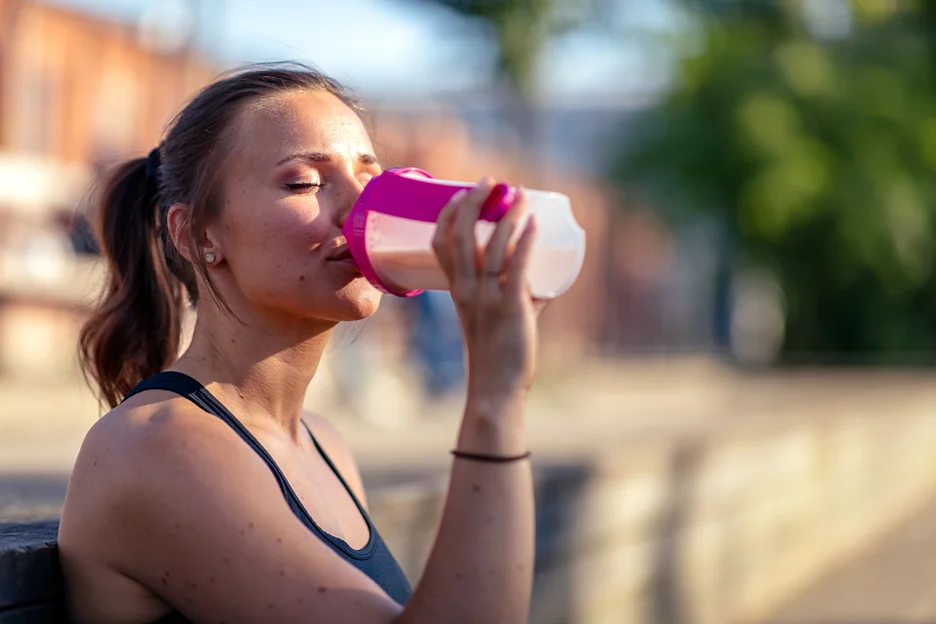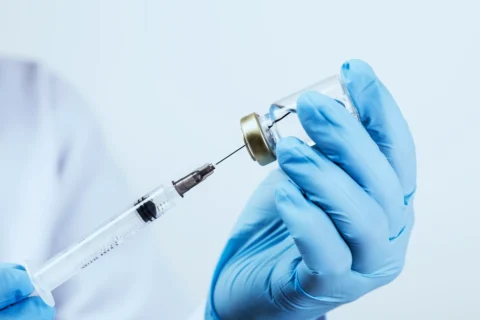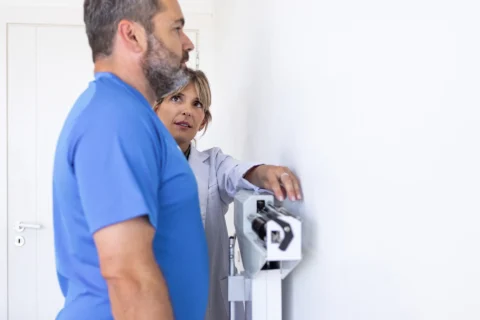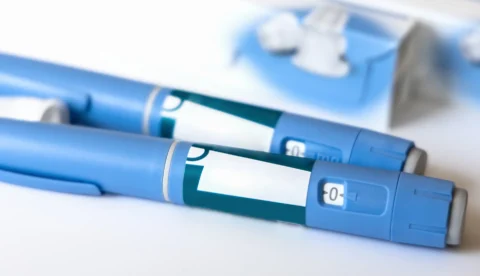In this article, we’ll discuss the science, the myths, and the reality of whether creatine holds the secret key to shedding those stubborn pounds.
What Is Creatine, and How Does It Work in the Body?

Creatine is a compound that is naturally produced in the body and obtained through diet. It plays an important role in supplying energy to muscles and the brain.
Creatine helps produce ATP (adenosine triphosphate), which is the molecule that provides energy for many biochemical processes in the body. It does this by increasing the levels of phosphocreatine in muscles.
Phosphocreatine acts as a short-term energy reserve and replenishes ATP. This gives muscles a faster source of energy during bursts of intense exercise like sprinting.
When taken as a supplement, creatine is absorbed into the muscles where it is converted to phosphocreatine. This increases the muscles’ ability to produce energy rapidly during exercise. It can lead to increased strength, muscle mass, and performance gains.
Creatine supplementation has also been shown to increase total body water and improve hydration and thermoregulation during exercise. This allows for better endurance.
Does Creatine Directly Burn Fat?
Creatine alone does not directly burn fat. While creatine can help you build muscle mass and increase workout intensity, which may lead to higher calorie burn, it does not target or break down fat tissue directly.
Some studies have found creatine supplementation can increase endurance without affecting fat mass. By maintaining lean muscle mass on a calorie-restricted diet, creatine may indirectly support fat loss over time.
However, to lose fat, you need to maintain a calorie deficit through diet and exercise. Creatine is not a weight loss supplement and does not target belly fat like some other supplements claim to.
Can Creatine Increase Thermogenesis (Fat Burning)?
Creatine supplementation has been shown to increase white adipose tissue thermogenesis in some studies. Genetic depletion of creatine metabolism in adipose tissue inhibits diet-induced thermogenesis.
Creatine is thought to support adipose tissue energetics and thermogenesis. By enhancing a creatine-driven substrate cycle in adipose tissues, it may enhance energy expenditure and combat obesity.
However, the effects are complex and not fully understood. More research is still needed on how creatine specifically impacts thermogenesis and fat loss over longer periods.
Taking creatine alongside other proven thermogenic ingredients in a fat burner supplement may provide an additional indirect benefit, but creatine alone is not a primary thermogenic compound.
In summary, while creatine appears to play some role in adipose tissue function and thermogenesis, its direct impact on fat loss is unclear based on current evidence. More long-term research is warranted to fully understand its thermogenic effects.
How Does Creatine Affect Muscle Mass and Metabolism?
Creatine supplementation has been shown to increase muscle creatine and phosphocreatine levels which provides more phosphate energy for muscle contraction and growth.
Several studies have found that taking creatine combined with resistance training can help increase muscle mass and strength in people aged 18-30. However, the exact mechanisms are still not fully understood.
Creatine supplementation alone without exercise does not seem to increase muscle mass. Regular exercise is needed to stimulate muscle growth. Some evidence also suggests creatine may increase fat-free mass by improving energy production in muscle cells and enhancing recovery between bouts of exercise.
Creatine plays an important role in cellular energy metabolism as it helps shuttle phosphate groups within muscles during exercise. While creatine itself does not directly boost metabolism, maintaining more muscle mass from creatine and training can increase resting metabolism over time.
Overall, creatine intake appears to be generally safe for most healthy individuals when taken as recommended.
Does Creatine Help Preserve Muscle During Weight Loss?

Creatine supplementation may help preserve muscle mass during periods of calorie restriction like weight loss or cutting phases. Studies show creatine can indirectly promote weight loss by increasing muscle mass and energy levels.
While no direct studies examine creatine and weight loss, research suggests creatine can help preserve lean mass during cutting. Creatine supplementation combined with resistance training may help burn more fat mass than resistance training alone.
By helping muscles recover from workouts, creatine may support continued strength training which can further aid in preserving muscle during weight loss. However, weight loss through calorie deficit is still important to pair with creatine supplementation to see full benefits to body composition.
Can Creatine Suppress Appetite and Cravings?
Creatine supplementation has been shown to both increase and decrease appetite in different studies:
Some research suggests creatine can increase levels of gut peptides like CCK and GLP-1 that are involved in appetite regulation. This may lead to decreased appetite and food intake.
However, other studies have found creatine does not suppress appetite or increase calorie burn. It also does not seem to cause significant weight changes overall.
Anecdotal reports from individuals are mixed, with some noticing increased hunger while taking creatine and others reporting decreased appetite or cravings.
Any weight changes from creatine are usually from increased water retention and muscle gains rather than fat gains.
What Is the Optimal Dosage of Creatine for Weight Loss?
The optimal dosage of creatine for weight loss according to the context provided is 3-5 grams per day. Smaller daily doses of 3-5 grams have been shown to be effective for weight loss without weight gain.
Maintaining creatine levels can be achieved with a daily dose of 2-3 grams. It is recommended to avoid creatine supplementation if trying to lose weight as it may cause weight gain in the form of lean body mass.
Is Creatine Suitable for Everyone Trying To Lose Weight?
Creatine can help with muscle retention during weight loss efforts, but does not directly lead to fat loss. Some key points:
Creatine provides no benefits for weight loss itself, as it does not impact calorie burn or fat loss.
Most research shows creatine is safe for healthy adults when used as directed. However, some individuals may experience water retention.
Creatine can help maintain muscle mass during calorie deficits, which supports weight loss goals focused on fat loss over muscle loss. This allows for faster metabolism over time.
Elderly individuals or those with kidney/liver issues should check with a doctor before using creatine.
Short-term water retention from creatine is normal but will not affect long-term fat loss. Sticking to a calorie deficit is key for weight loss.
Proper dosage is typically 0.03-0.1 grams per pound of body weight per day. More is unlikely to provide additional benefits.
How Long Does It Take To See Results From Creatine for Weight Loss?
It typically takes 1-4 weeks of consistent creatine supplementation to see results, according to sources. Creatine can help with weight loss by promoting muscle gain which increases metabolism.
However, creatine alone will not directly cause weight loss – it must be combined with a calorie-restricted diet and exercise routine for fat loss results.
The effects are modest and creatine is not a replacement for proper diet and training. More research is still needed on creatine’s direct impact on weight management.
Is It Okay To Combine Creatine With Other Supplements or Medications?
Creatine supplements have been found to be safe when taken with caffeine. Research suggests creatine does not negatively interact with caffeine at recommended doses.
The safety of combining creatine with other supplements or medications depends on the individual ingredients. Creatine supplementation may be safe for most people when taken as recommended by the manufacturer.
However, supplements should be avoided if you have any medical conditions or take medications, without consulting a health professional first.
Supplements can potentially interact or interfere with prescription drugs. It is generally recommended to only take one supplement at a time, until you know how your body responds individually. People with kidney disease may want to avoid creatine, as it could make their condition worse.
Is Creatine a Magic Bullet for Weight Loss?

Creatine is not considered a magic bullet for weight loss. While it may offer some benefits like increased muscle mass when combined with exercise, the context suggests creatine alone will not lead to significant weight loss.
Losing weight requires a balanced diet and exercise. There is no supplement that can replace proper diet and lifestyle changes for successful and sustainable weight management.
Creatine may aid in muscle building but will not compensate for a poor diet or lack of exercise. More research is still needed on its direct effects on fat loss







